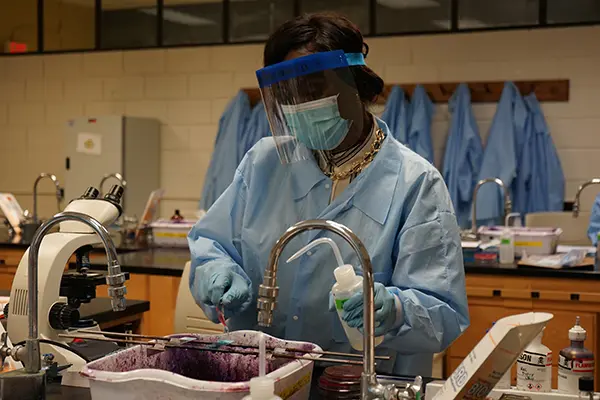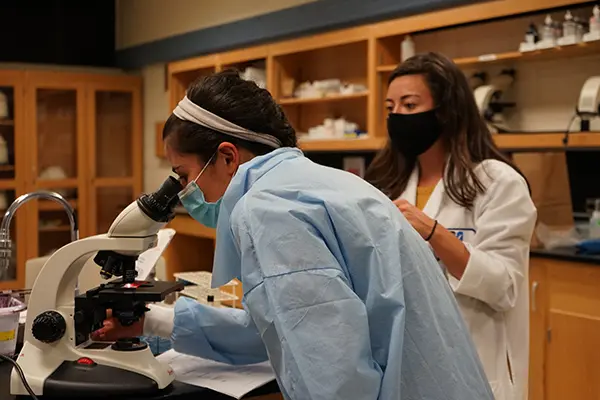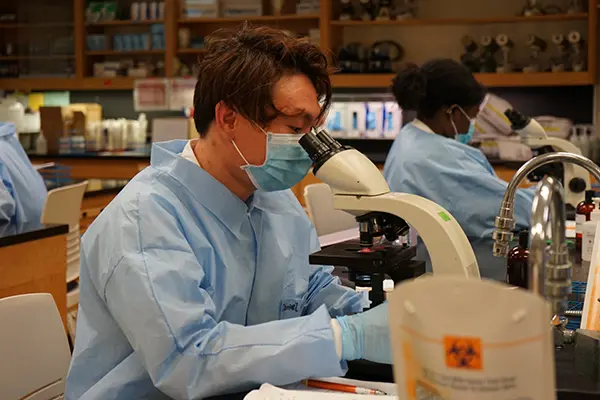Hospitals, Diagnostic Labs Eager to Hire UML Medical Lab Science Majors
 Image by K. Webster
Image by K. Webster
09/15/2020
By Katharine Webster
Even before the COVID-19 pandemic overwhelmed hospital and public health laboratories, medical laboratory science student Dannalee Watson knew that she could get a job the day after graduation – if not sooner.
Board-certified medical laboratory scientists were already in short supply before the pandemic hit. Now, the demand for quick, accurate COVID-19 test results means that students like Watson are more sought after than ever.
“The job outlook, even before COVID-19, was so amazing,” Watson says.
Students in the Medical Laboratory Science (MLS) Program learn how to analyze all kinds of medical tests in their laboratory classes and required professional practicums. They don’t just run samples of blood, saliva and urine through analyzer machines: They have to interpret the results to help doctors diagnose patients and monitor treatments.
Watson says it’s like being a medical detective. And every case is different.
“No day is the same. It’s interesting: It’s like you’re figuring out a puzzle with your patient,” she says. “Then we can help the doctor make decisions. That’s the cool part.”
Watson, a senior, is one of only 25 to 30 students accepted each year into UMass Lowell’s Medical Laboratory Science Program, which is nationally accredited and qualifies students to take the American Society for Clinical Pathology exam, says program director and Clinical Asst. Prof. Jennifer Nicoloro ’11 ’13 ’18. After passing the exam, graduates become board-certified medical lab scientists.
Many are offered jobs during one of their lab practicums, before they even graduate, and are then given a few months after graduation to complete the exam, Nicoloro says. Fully 100 percent of UMass Lowell’s medical lab science graduates are employed in the field in the first three years after graduation, with salaries starting around $50,000 a year in the greater Boston area and rising into six figures with experience and further specialization.
 Image by K. Webster
Image by K. Webster
“Medical lab scientists have a unique, niche skill set that’s very desirable. Our graduates have board certification, they have real-world experience, and they get great entry-level jobs,” Nicoloro says. “They have a lot of autonomy in the first year of their career, too. They work on the bench by themselves and they’re responsible for a higher level of care for their patients.”
Yet the field isn’t well known or understood, because medical lab scientists’ work is largely invisible to the public. Senior Lisa Dale had no idea what medical lab science was until she was applying to colleges, even though her older sister, Julie Dale ’16, had graduated from UMass Lowell’s Medical Laboratory Science Program.
“While she was in it, I had no idea what she was doing,” Lisa Dale says. “When I was applying to schools, I had no idea what I wanted to do – either something in the medical field or in business. My sister said, ‘Why don’t you try the Medical Laboratory Science Program, and if you don’t like it, you can switch.’”
So Dale entered UMass Lowell as an applied biomedical sciences major. The major offers two options: clinical science or medical laboratory science. Students on both tracks take the same health science classes their first two years.
If students want to enter the Medical Laboratory Science Program, they have to apply by spring of their sophomore year. Those who are accepted spend their junior and senior years completing a rigorous and highly structured series of classes, labs and practicums that result in their eligibility for the board certification exam. (Clinical science students have more flexibility to select courses in areas that interest them, and often go on to careers in biomedical science research and the biotech industry.)
Dale started on the MLS program and liked her first two lab classes. She says the professors are welcoming and supportive: “They’re very friendly and helpful, and they really understand what you’re going through.”
Meanwhile, her sister brought Dale to work at Lahey Hospital & Medical Center and showed her around the lab, “which just drew me in more,” Dale says. Dale now works at Winchester Hospital as a lab associate, preparing patient samples for testing. The hospital wants to promote her to medical lab scientist after she graduates, she says.
 Image by K. Webster
Image by K. Webster
Senior Daniel Huang loves his lab classes, like Dale and Watson. And, like Dale, he learned about the field because one of his older sisters was already working as a medical lab scientist.
But what drove Huang to excel was his grandmother’s diagnosis with colon cancer in 2017. As he began his freshman year at UMass Lowell, he took on the role of explaining all of the testing and chemotherapy to his grandmother and parents.
“I really like this major because you can study some issue in particular, like cancer,” he says.
All medical laboratory science majors do five practicums, working one-on-one with a scientist in a hospital, blood bank or independent lab in each of five areas: hematology, microbiology, clinical chemistry, urinalysis and immunohematology (blood bank). They learn even more specialties on campus, Huang says.
“This major has a lot of hands-on experience,” he says.
Huang plans to work as a medical laboratory scientist in a hospital or advanced diagnostic lab after graduation “and see how it goes.”
Dale plans to earn a master’s degree in biomedical engineering at UMass Lowell through the bachelor’s-to-master’s program, because ultimately she wants to work in a research lab doing tissue engineering or cell culture.
Nicoloro says graduates of the Medical Laboratory Science Program have lots of career paths open to them. Many continue on for a master’s degree in clinical laboratory sciences through the bachelor’s-to- master’s program, as Nicoloro did before earning a Ph.D. in biomedical engineering.
The M.S. in clinical lab sciences gives graduates even more diagnostic skills and also prepares them for management positions or high-level jobs in the biotech and life sciences sector, Nicoloro says. Other graduates get more specialized degrees, going into pathology or a research lab. Some even go to medical school or pursue a Ph.D., she says.
“I tell students that medical laboratory science will always open more doors than it will close, because you have this desirable, specialized skill set,” she says.




